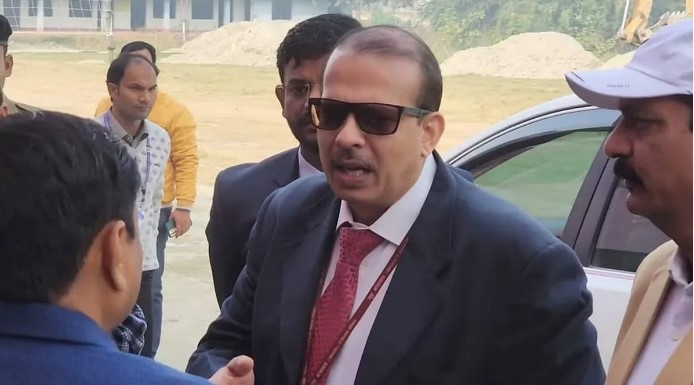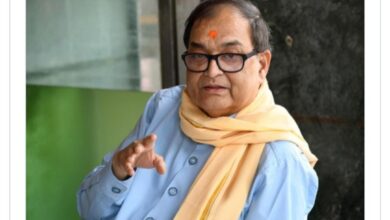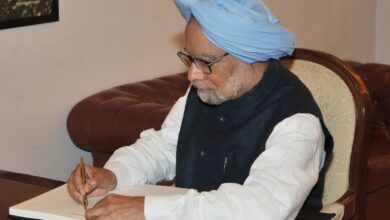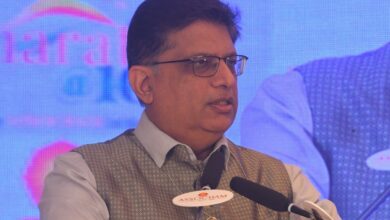
Keshav Kumar Pathak (KK Pathak), a 1990-batch officer of Indian Administrative Service (IAS), has grabbed headlines for introducing several reforms in Bihar’s education system. He is often referred as TN Seshan of Bihar’s education. His tough, no-nonsense, fearless, and swashbuckling image is reminiscent of the former election commissioner of India. He strikes dread among students, teachers, and school administrators. Like Seshan with the electoral system, Pathak wants to overhaul Bihar’s schools, from teaching quality and attendance to learning outcomes.
Recently, when Bihar Chief Minister Nitish Kumar distributed appointment letters to 1.20 lakh teachers, one person who got the loudest cheers was Education Department Additional Chief Secretary (ACS) K K Pathak. So much so that the CM too could not but acknowledge that “Hum log dekh rahe hain Pathakji kitne popular hain (We are all seeing how popular Pathakji is)”.
Just a month earlier, in the last week of November, about 15 MLCs had met Nitish demanding Pathak’s immediate removal for stopping the pension of retired professor and CPI MLC Sanjay Kumar Singh, reportedly because of Singh’s opposition to instructions regarding university teachers, in his capacity as general secretary of the Federation of University Teachers of Bihar.
That, in a nutshell, is Pathak, who has left the Education Department astir despite just six months as its ACS. Hence, few know what to make of an Education Department letter doing the rounds that Pathak has “voluntarily” relinquished his position with effect from January 9.
A senior government official, for one, told The Indian Express that Pathak has only given charge to another official “till January 14, his leave period”.
Characteristically, the letter followed a fracas involving Pathak and the Raj Bhavan, and an audio of his that went viral.
“The Governor’s office recently objected to frequent interference by Pathak in the functioning of higher education, which amounted to undermining the authority of the Governor as Chancellor of universities,” a source said.
The audio tape that went viral purportedly features Pathak hurling abuses at former Indian Medical Association president Dr Ajay Kumar, who had criticised the ACS earlier. Kumar has lodged a police complaint against Pathak over the tape.
The blue-eyed boy
Nitish and Pathak, 55, a 1990-batch IAS officer, go back a long way, with the latter becoming Managing Director of the Bihar Industrial Area Development Authority and later of the Bihar State Awas Board after Nitish became CM for the first time in 2005. He also served as Secretary in the Education Department, before going on Central deputation in 2010.
In 2015, Nitish sought his return to Bihar and roped in the bureaucrat to draft provisions of the prohibition law introduced by him.
The decision to pick Pathak for the Education Department was strategic. “As the department has been under RJD Minister Chandra Shekhar, Nitish wanted a strong and dynamic bureaucrat who could start new initiatives,” a JD(U) leader said.
Pathak hit the ground running after joining the Education Department in June 2023, introducing a host of measures – such as cutting down the holiday list and increasing school hours – trodding on several feet in the process, including of teachers, Education Minister Chandra Shekhar and the Raj Bhavan. The measure to take several Hindu festivals off the holiday list also sparked off a controversy.
However, what has kept Pathak going is the backing of the CM. To complaints against the ACS, Nitish has been known to tell aides, “Ek aadmi achchha kaam kar raha hai, usse bhi log hatana chahte hain (One person is doing good work, and people want to remove him too)”.
The ‘reformist’
In seven months as ACS, Education, Pathak issued over 100 letters to district magistrates, district education officials and other officials, even as he travelled across the state, inspecting schools and notching up viral social media videos and reels.
In interactions with newly-appointed teachers, Pathak was captured telling them to focus on rural education, or to quit if not up to the rigours of the job. Remarks such as “Agar mazdoor ka beta mazdoor hi banega, to hamari kya zaroorat (What is the need for us, if the son of a labourer becomes a labourer)” won him instant fame, and popularity – even as teachers grumbled at being made “scapegoats”.
Pathak’s other measures included an app to track the attendance of students as well as teachers, to check fudging of records; the initiation of biometric system of attendance phase-wise, to gradually be extended to all 72,663 Bihar government schools, so as to have correct records regarding midday meals, for example; Internet connectivity for 4,602 senior secondary schools; routine and surprise inspections to check attendance as well as quality of midday meals and status of washroom facilities; regularising leave applications by teachers; empanelling retired teachers to help collect data; and provision of basic infrastructure like benches, to ensure that “no student sits on the floor”.
Officials said a survey showed that of the 72,663 government schools in Bihar, more than 15,000 did not have benches or desks, even as allocated funds remained unutilised.
Another measure by Pathak that became very popular was provision of coaching for engineering and competitive exams in government schools, acknowledging the reality that students depended on the same for basic English, maths and science. In a letter to DMs last October, Pathak wrote: “Lack of teachers in secondary and higher secondary schools is a major reason why students are going to coaching institutes… The department is enlisting certain institutions… which will take science, mathematics, English and computer classes at fixed rates… and will be paid for by the department.”
In another measure to check dropout rates, Pathak announced ‘Mission Daksh’ to offer special classes for students struggling in subjects. Under the programme, a teacher takes on such five students at a time, across Classes 3 to 8.
The ‘maverick’
If Pathak earned accolades for the above measures, his other announcements too kept hitting the headlines, such as a ban on wearing of jeans and T-shirts to office by Education Department employees; an order that teachers not be part of any union or association, or take part in any dharna; separate annual holiday lists for Hindi and Urdu-medium schools, with some holidays taken off the list such as for Durga Puja and Jitiya and Rakshabandhan; and the instruction that teachers report to schools during the entirety of the summer vacations, with over 150 of them getting notices for airing their views on social media against this.
Where Pathak landed in hot water, however, was a decision to withhold the salary of over 1,200 teachers for “absenteeism”, and the denial of pension of some university teachers for apparently criticising his decisions.
On at least four occasions since last June, the Education Department also came in direct conflict with the Raj Bhavan. On June 16, the Education Department wrote to state universities not to introduce four-year degree courses that had been approved by Governor R V Arlekar, in line with UGC recommendations. But the Raj Bhavan had the final say.
On August 18, the Bihar Education Department withheld the salary of the VC and the pro-VC of B R Ambedkar Bihar University. Raj Bhavan reversed the decision a day later. On August 22, the Education Department invited applications for appointment of VCs of five state universities, despite Raj Bhavan having brought out a similar advertisement on August 4. The CM met the Governor amid the tussle, with Pathak’s department finally withdrawing the circular.
A B R Ambedkar Bihar University professor said that the Nitish government has ignored higher education, and the Governor is trying to “stem the rot”. “Using its bureaucracy, the state government is engaged in a confrontation with the Raj Bhavan to cling on to its power.”
And it’s not just the Governor that Pathak has left upset. Bihar Education Minister Chandra Shekhar reportedly feels the ACS does not take him into confidence. In July, just a month after Pathak took over, a letter believed to have been written by the minister’s personal secretary to officials in the Education Department had gone public.
The letter read: “The department has been more in the news for kadak, sidha karne, nut and bolt tight karne (being strict and taking stringent action against errant employees), cleaning, dress code… nakel kasne (bringing some to book), deducting salaries and suspending employees… The minister wants the Robin Hoods and actors among officers to be punished.”
Although the letter was not signed by anyone, Education Department Director (Administration) Subodh Kumar Chaudhary had taken on the minister’s private secretary in a public spat, saying “his entry to the department had been barred”. It also sought to know the details of the private secretary’s PhD degree on the basis of which he used the title of “Dr” in his name.
The bad blood had led to Chandra Shekhar complaining to RJD chief Lalu Prasad, and to Nitish stepping in. Chandra Shekhar later told the media: “Everyone knows whose position is superior as per the Constitution.” The last word, though, may not have been heard on the Pathak matter.
(With Input from The Indian Express & The Print)




